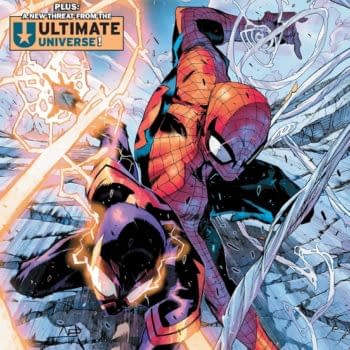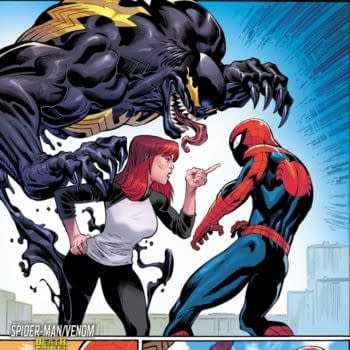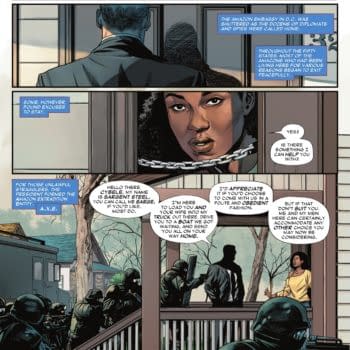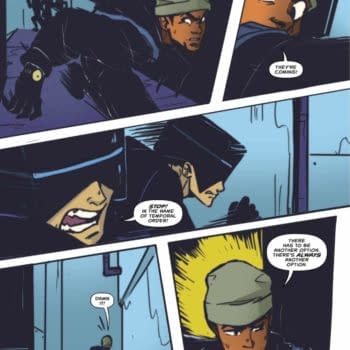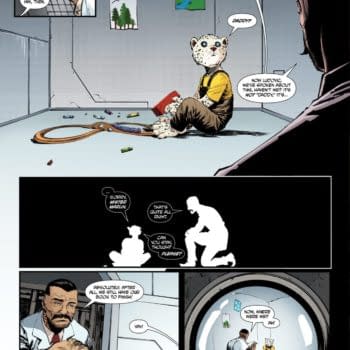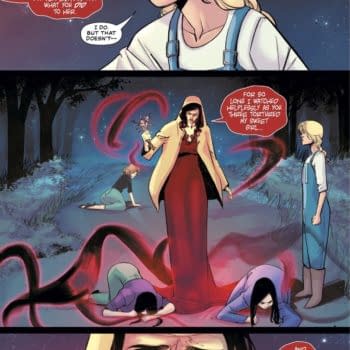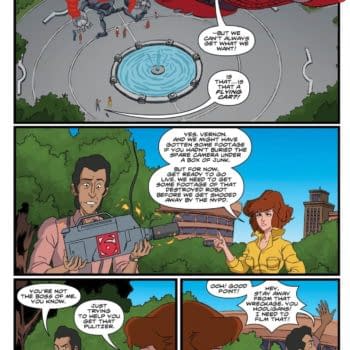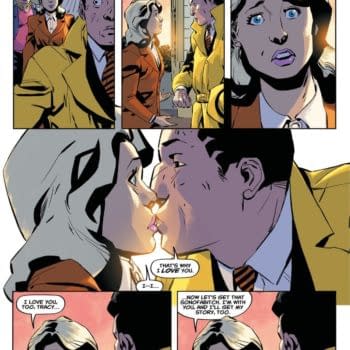Posted in: Comics | Tagged: before, captain america, Comics, ed brubaker, marvel, Watchmen
Ed Brubaker On Leaving Captain America, Working For Marvel, And Despairing About Before Watchmen
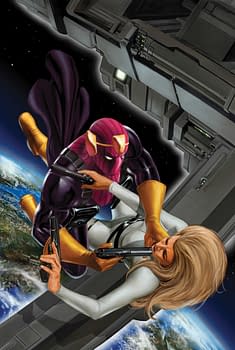
On leaving Cap (but staying on Winter Soldier)
SPURGEON: Now, you told me that you're wrapping up on Captain America.
BRUBAKER: Yeah. By the time this interview comes out, I will have written my last issue.
SPURGEON: Congratulations. And that's… eight years on Cap?
BRUBAKER: A little less than eight years. I think I started in August or September of 2004 writing my first issue, which came out in November of that year.
SPURGEON: So why now?
BRUBAKER: Partly, it's the beginning a shift from work-for-hire to books I own, instead. I hit a point with the work-for-hire stuff where I was starting to feel burned out on it. Like my tank is nearing empty on superhero comics, basically. It's been a great job, and I think I found ways to bring my voice to it, but I have a lot of other things I want to do as a writer, too, so I'm going to try that for a while instead.
Which, considering that Cullen started co-writing the comic with issue 15, means that Brubaker's last issue will be #19.
On working with the Marvel system;
SPURGEON: Don't they team you up with a writer to transition out of these titles? Like baton pass it to them?
BRUBAKER: That's not on purpose for this one. That was a situation with scheduling. Marvel is trying to do this thing now that with some of their better-selling books they want to get out more copies per year than 12. They want to get out 15 or 18 issues. Amazing Spider-Man's been doing more than one a month for a while now; someone I know does Uncanny X-Men or one of those books, and that comes out 18 times a year.
I couldn't keep up with that schedule, honestly. I knew I was getting to the end of my run. I wanted to wrap up my run earlier. And [Marvel Senior Vice President Of Publishing] Tom [Brevoort] was like, "Well, you're going to leave a bunch of plot lines dangling… do you want to go out like that? It'll seem like you threw up your hands and said 'I can't keep up with this schedule.'" I was like, "No, I don't want to go out that way." So we brought in Cullen Bunn to write an arc with me. I gave him a list of a bunch of stuff. "Here's all the dangling plot threads and here's where we need them all to be by the time I get to my last issue." And then we figured out a storyline together.
It's strange. I did all these issues as an uninterrupted run. Then there's four issues co-written by someone. Then there's a last issue. [laughs] It's a little odd.
And talking about Before Watchmen and Alan Moore;
BRUBAKER: But the thing that really bugged me was when Watchmen was announced it was, coincidentally, that same summer the entire industry rallied around Jack Kirby against Marvel. It was the era of the "Creator's Rights Revolution" and DC really used Watchmen at the time. Part of the PR was that it was creator-owned, that these guys would get this property back. DC used it to position themselves against Marvel as the more creator-friendly company.
I was at the San Diego Comic-Con the year that Alan Moore was there. I saw him talk about Watchmen and what a revolutionary thing it was that they'd gotten this deal for it. Part of it felt like a promise to the industry that things were changing. That this was different. And so while the book never went out of print and they never got their ownership, I always felt that on some level Paul Levitz seemed to respect the spirit of the deal: that they had created this thing and while DC officially owned it, Alan Moore and Dave Gibbons had moral ownership of it, at least.
Oh and let's just add this exchange as well;
BRUBAKER: Really, though, the saddest part for me is the "fuck Alan Moore; he signed a shitty contract" thing. That's really, really sad. When JMS at the Chicago Comicon — or wherever that was — said, "Did Alan Moore get a shitty contract? Yes. Jack Kirby got a shitty contract, too." That really, to me, when I was reading that I was like "Holy shit." Siegel's and Shuster's and Kirby's shitty deals are now being used to defend a project as opposed to…
SPURGEON: … indict a company.
Enjoy…






